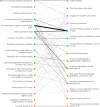Strategies to Improve the Impact of Artificial Intelligence on Health Equity: Scoping Review
- PMID: 38875587
- PMCID: PMC11041459
- DOI: 10.2196/42936
Strategies to Improve the Impact of Artificial Intelligence on Health Equity: Scoping Review
Abstract
Background: Emerging artificial intelligence (AI) applications have the potential to improve health, but they may also perpetuate or exacerbate inequities.
Objective: This review aims to provide a comprehensive overview of the health equity issues related to the use of AI applications and identify strategies proposed to address them.
Methods: We searched PubMed, Web of Science, the IEEE (Institute of Electrical and Electronics Engineers) Xplore Digital Library, ProQuest U.S. Newsstream, Academic Search Complete, the Food and Drug Administration (FDA) website, and ClinicalTrials.gov to identify academic and gray literature related to AI and health equity that were published between 2014 and 2021 and additional literature related to AI and health equity during the COVID-19 pandemic from 2020 and 2021. Literature was eligible for inclusion in our review if it identified at least one equity issue and a corresponding strategy to address it. To organize and synthesize equity issues, we adopted a 4-step AI application framework: Background Context, Data Characteristics, Model Design, and Deployment. We then created a many-to-many mapping of the links between issues and strategies.
Results: In 660 documents, we identified 18 equity issues and 15 strategies to address them. Equity issues related to Data Characteristics and Model Design were the most common. The most common strategies recommended to improve equity were improving the quantity and quality of data, evaluating the disparities introduced by an application, increasing model reporting and transparency, involving the broader community in AI application development, and improving governance.
Conclusions: Stakeholders should review our many-to-many mapping of equity issues and strategies when planning, developing, and implementing AI applications in health care so that they can make appropriate plans to ensure equity for populations affected by their products. AI application developers should consider adopting equity-focused checklists, and regulators such as the FDA should consider requiring them. Given that our review was limited to documents published online, developers may have unpublished knowledge of additional issues and strategies that we were unable to identify.
Keywords: algorithmic bias; algorithms; artificial intelligence; decision making; equity; gray literature; health care disparities; health data; health equity; machine learning; social determinants of health.
©Carl Thomas Berdahl, Lawrence Baker, Sean Mann, Osonde Osoba, Federico Girosi. Originally published in JMIR AI (https://ai.jmir.org), 07.02.2023.
Conflict of interest statement
Conflicts of Interest: None declared.
Figures


References
-
- Secinaro S, Calandra D, Secinaro A, Muthurangu V, Biancone P. The role of artificial intelligence in healthcare: a structured literature review. BMC Med Inform Decis Mak. 2021 Apr 10;21(1):125. doi: 10.1186/s12911-021-01488-9. https://bmcmedinformdecismak.biomedcentral.com/articles/10.1186/s12911-0... 10.1186/s12911-021-01488-9 - DOI - PMC - PubMed
-
- Yin J, Ngiam KY, Teo HH. Role of Artificial Intelligence Applications in Real-Life Clinical Practice: Systematic Review. J Med Internet Res. 2021 Apr 22;23(4):e25759. doi: 10.2196/25759. https://www.jmir.org/2021/4/e25759/ v23i4e25759 - DOI - PMC - PubMed
-
- Noorbakhsh-Sabet N, Zand R, Zhang Y, Abedi V. Artificial Intelligence Transforms the Future of Health Care. Am J Med. 2019 Jul;132(7):795–801. doi: 10.1016/j.amjmed.2019.01.017. https://europepmc.org/abstract/MED/30710543 S0002-9343(19)30120-2 - DOI - PMC - PubMed
-
- Topol E. Deep medicine: how artificial intelligence can make healthcare human again. New York, NY: Basic Books; 2019.
Publication types
LinkOut - more resources
Full Text Sources

